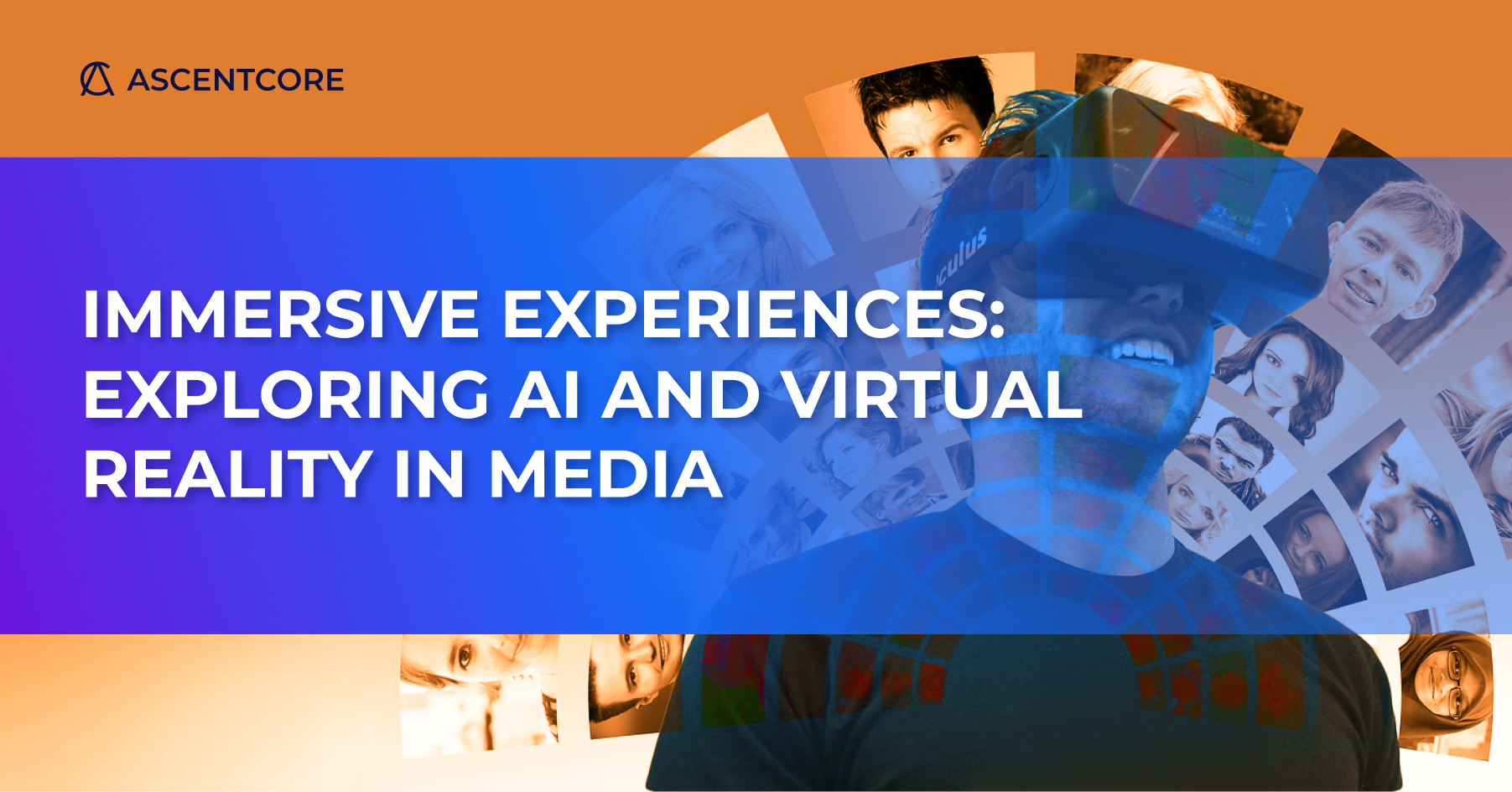AI and Virtual Reality in media have the transformative powers to reshape the entertainment industry with immersive, interactive, and personalized experiences for users. Here at AscentCore, we’ve been keeping a close eye on these technologies for a while, and we’re excited to see how they’re reshaping how media is produced and consumed. Keep reading as we explore how these technologies are transforming the media landscape.
How AI and VR are impacting the media and entertainment industry
- Enhanced Storytelling: AI algorithms can analyze user preferences and behavior to tailor narratives in real-time. This allows for dynamic storytelling where characters, plotlines, and outcomes can change based on individual choices and reactions, creating a more immersive and personalized storytelling experience.
- Immersive Journalism: Journalists can use VR to take audiences to the heart of a story. For example, VR documentaries can transport viewers to war zones, disaster areas, or remote locations where they can feel like they’re physically immersed in the story. AI can enhance the experience by providing real-time information, translations, and additional context.
- Interactive Gaming: One of the most promising applications of AI and VR is in the video game industry. Many developers are using AI to create more realistic and responsive virtual characters, while VR allows players to step into the game like never before. Additionally, AI-powered NPCs (non-playable characters) can make gaming more lifelike and challenging with these characters adapting to player behavior. Similar to immersive journalism, the result is a more engaging and life-like gaming experience that can blur the line between reality and fantasy.
- Personalized Content Recommendations: AI can analyze user preferences and behaviors to curate VR content, whether it’s movies, games, or educational experiences. This personalization ensures users are more likely to engage with the content they find interesting and offers content creators invaluable information and data about their customers that can be used to continually improve their products. Additionally, AI can assist content creators in generating realistic 3D environments, characters, and objects, reducing the time and effort required for VR content development. This can democratize VR content creation and lead to a more diverse range of experiences.
- Improved Accessibility: VR can provide immersive experiences for individuals with disabilities and different needs through the use of AI-powered features such as voice commands, gesture recognition, and haptic feedback. They can make different experiences – from playing games to watching media or listening to music – more inclusive and accessible for all.
- Virtual Social Interaction: AI-driven avatars and social algorithms can create lifelike virtual environments for social interactions, whether socializing, collaborating, or networking. This application can be useful for professional settings, such as a conference or meeting, or for entertainment purposes, such as social media or watching a live TV show with friends from around the world.
A few things to consider
While AI and VR have the potential to transform media and entertainment offerings in a beneficial way, there are a few challenges and ethical considerations to keep in mind when integrating this technology in media, such as:
- Ethical AI: Ensuring AI systems make ethical decisions, especially in immersive experiences that involve real-world scenarios, is essential to avoid harm or bias.
- Cost and Accessibility: Making AI-driven VR experiences affordable and accessible to a wider audience is a challenge and important to ensure accessibility for all.
- Privacy Concerns: Collecting and analyzing user data for personalization can raise privacy concerns. Striking a balance between personalization and privacy is crucial.
- Content Regulation: As VR and AI blur the line between reality and simulation, regulatory challenges related to content, censorship, and age-appropriate experiences need to be addressed.
Moving ahead with AI and VR
AI and VR are reshaping the media landscape by creating more immersive and interactive experiences. As technology continues to advance, addressing ethical, regulatory, and accessibility concerns will be essential to maximize the potential benefits of these immersive experiences in media and entertainment.
If you’re curious to learn how AI technology could help your business, check out our use case or reach out to AscentCore. With a focus on AI and ML, we deliver transformational results for our clients by leveraging the latest technology and empowering companies to disrupt, transform, accelerate, and scale.



